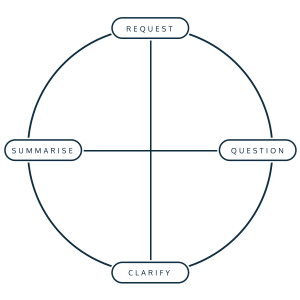Keeping the conversation moving forward: Process Tools and the Conversational Model
In last week's post on Content vs Process, I discussed the distinction between the coachee being responsible for the content of the coaching conversation, while the coach holds the process ultimately co-partnering with their coachee towards the achievement of their goals.
Conversations lie at the very core of what coaches do in order to move their clients forward. To be successful as a coach requires skill and knowledge of the processes and techniques of coaching.
What tools can we use to direct the process of the coaching conversation in a way that holds our clients to account for their actions, while remaining non-directive in terms of the content?
During the NPCA programme, our students learn to use Process Tools to steer the coaching conversation and today, I would like to delve a little deeper into Process Tools and how we can use them in our coaching conversations.
In brief, the Process Tools are:
- Request
- Question
- Clarify
- Summarise
Let’s discuss each one in a bit more detail.
Questions are just that. They are questions. However, Requests are also questions. So what is the difference between a Question and a Request? The main difference between these two is who we are asking the question for.
When we ask a Question in coaching, we are asking the question for the coachee to help them to gain greater awareness and insights for themselves. We do this by asking powerful questions that help our clients to think in new ways and to be responsible for their own actions and choices.
A Request, on the other hand, is asking something of the other person. Requests include asking permission to take notes, asking permission to move forwards into a new area of conversation, asking to share an intuition based on what we have noticed, asking to introduce a tool that you think might work for the client. Whenever we bring something to the conversation that is not currently part of the coachee's content, then we make a request. Often these requests come from our intuition that this will be useful for our coachee and by requesting permission, we give the power over the conversation back to the coachee.
Clarify and Summarise, on the other hand, are both statements. The difference being that one is related to content and the other to process.
When we clarify, we reflect back the content of the conversation to our client allowing them to potentially gain more clarity in doing so. Working with a recent client, I paraphrased what I had heard, “so to clarify, what I’m hearing is that currently work takes priority over family.” On hearing my words, my client realised that his current behaviour was actually aligned with the clarification I had made, however, that this was not actually what he wanted. He was then free to be able to explore changing his behaviour with his new awareness.
The purpose of summarising is to help the coachee understand where they currently are in the process of the conversation. For example "we have looked at where you are now in relation to your goal. The next step is to look at what you want instead." The intention of doing this is to help your client feel safe and supported in the knowledge that there is a process that will ultimately lead them from where they are now to where they want to go.
When we put all four of the Process Tools together, they make up the Conversational Model, as shown in the diagram above.
By using Active Listening skills and being aware of the client’s content, the coach combines the four Process Tools together to form a structured coaching conversation. While the coach is free to use any of the tools at any time during the conversation, the skill lies in our intuition informing us to use the tool that will have the greatest impact for our client at any given moment.
By using these skills not only in our coaching conversations, but in our everyday conversations with our work colleagues and our families, we can create a greater impact through our conversations, both for others and for ourselves.
Next week, I will introduce you to the North Point Meta-Model (NPM) which underpins our coaching philosophy and helps us to understand what drives our actions and impact.
Please comment below on this latest post. Matt and I would love to hear your feedback on our coaching tools.
As an aside, if you want these future articles delivered to you inbox you can sign up to the NPCA Community.
North Point Coaching Academy runs a 16-week coach development programme, which is accredited by the International Coach Federation (ICF). You can read more about the NPCA Certificate in Professional Coaching on our website or contact me for more details on [email protected].
See you next week.
Sarah
